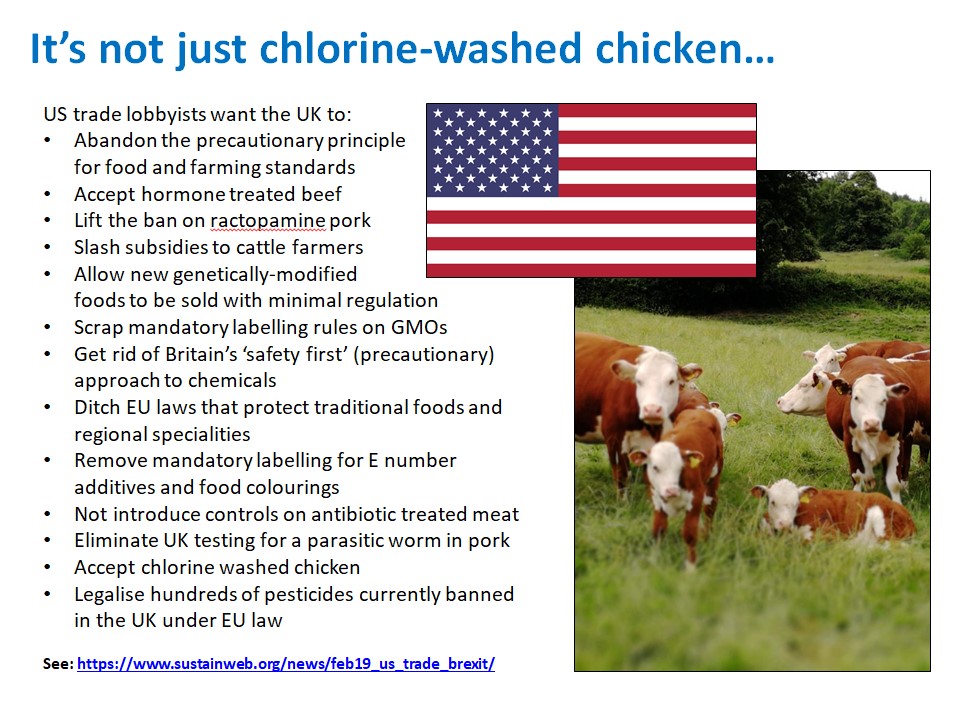

Four ways US trade deal could be bad for America as well as Britain
IATP in the US has teamed up with Sustain in the UK to show that people in both countries have a shared interest in ensuring that a US/UK trade deal is struck in the interests of people and the planet.
This article is co-authored by Orla Delargy from Sustain, with Sharon Treat from the Institute of Agriculture and Trade Policy.
Trade talks between the US and the UK have been fast-tracked and the kind of deal that emerges could pose significant risks to UK food and farming practices but also limit opportunities to improve US food and environmental standards and to begin moving away from its over-industrialised agricultural system. We’ve picked four top issues to examine in more detail: human health, animal welfare, farmers and workers, and climate change.
Tell your MP you want them to save your food standards
The UK Agriculture Bill is back in the House of Commons in October so we need you to take action NOW.
Human health (pesticides, antibiotics, food safety)
The US allows between 70 and 80 pesticides that are banned in the UK and also allows higher levels of residues in food. A US-UK trade deal could see pesticides and residues, currently banned in the UK on health and environmental grounds, reauthorised for the UK market. In addition, it could put in place measures that restrict the UK from introducing more protective standards in the future. The concern from the US perspective is that a trade deal could lock in current weak standards and stymie efforts to reform US pesticide laws. [For more detail, see Sustain and PAN UK’s Toxic Trade report]
Overuse of antibiotics can be a sign of cramped and dirty conditions that lead to disease and undermines public health by fuelling dangerous anti-microbial resistance.
A recent report by the Alliance to Save our Antibiotics found that US livestock received on average 5.4 times more antibiotics per animal in 2018 than their UK counterparts. This rises to 8 or 9 times more in US cattle. The US could use a free trade deal to seek to roll back existing UK rules, creating a new market for meat produced by overuse of antibiotics. Reducing the effectiveness of life-saving antibiotics hurts us all.
The same arguments apply to chlorine or chemical washes, which have long been illegal in the UK, but which are common practice in the US and which mask low standard, intensive farming practices that are damaging to US workers and the environment.
Animal welfare
The UK (due to UK and EU regulations) has detailed species-specific legislation on pigs, hens, broiler chickens and calves to protect their welfare on farm and at slaughter. The US by contrast has no federal legislation governing the welfare of farm animals. There are federal provisions on slaughter, but this legislation does not cover poultry. US legislation is also much less protective on the transport of live animals; for example, EU rules allow a maximum of 12 hours transport time for live chickens, but in the US, the limit is 28 hours. The UK has banned barren battery cages for egg laying hens since 2012 and sow stalls since 1999. There is no federal ban in the US and a majority of states lack such protections. The US has no mandatory labeling related to animal welfare concerns and doesn’t regulate the veracity of voluntary disclosures.
Facilitating this trade in low welfare meat locks in low standards for American farm animals and makes it harder to seek improvements in this area.
Farmers, farm workers, and meatpackers
If UK farmers drop their standards to compete with US produce they will struggle to meet EU standards, thereby losing their primary export destination which currently accounts for 60% of UK agricultural exports. Equally concerning, British farmers could be undercut by imported, lower standard food grown more cheaply on a larger scale. Expanding the UK market for the products of US industrial agriculture undercuts US domestic efforts to improve standards and high quality and organic farming.
The UK slaughtering industry will face pressures to meet the 'efficiency' of the US meatpacking industry, with workers experiencing increased risk of injury and illness as a result. Meatpacking is one of the most dangerous jobs in the US. An already bad situation is getting worse as the Trump administration turns over inspections to the industry itself, excessive line speeds lead to high injury rates and multiple environmental and safety violations go unchecked due to weak enforcement.
Chlorine or chemical washes for meat, long illegal in the UK, are common practice in the US and mask low standard, intensive farming practices. Responding to consumer concerns about chlorinated chicken, the US meat industry hasn’t reformed unsanitary practices on the farm but instead increasingly shifted to alternative chemical treatments. Spraying poultry carcasses with peracetic acid to sanitise the end product is now common in the US, but has had serious implications for worker health. Peracetic acid has been linked to workers’ respiratory problems, complicating the response to Covid-19, which has hit the US meatpacking industry hard, killing least 200 meatpacking workers to date. The faster processing lines also directly cause contamination as plastic and metal parts break off and fall into food in processing plants, leading to a major increase in recalls. We should not be facilitating trade produced to such standards.
Climate change
In addition to the ban imposed by the US negotiators on addressing the factors that contribute to dangerous climate change in the deal, the very fact of a trade agreement between the US and UK, which is designed to increase the shipping of goods across the Atlantic, will exacerbate greenhouse gas emissions. Provisions in the agreement could promote fossil fuel use and energy-intensive chemical, fertiliser and pesticide use in agriculture while limiting the authority of the UK government to regulate climate-harming practices.
Intensive industrialised livestock and dairy production are a major and growing source of climate-warming emissions. There is already evidence of growth of US-style intensive farms in the UK. One consequence of the UK leaving the EU and its Common Agricultural Policy is that the UK has the opportunity to establish its own agricultural policies and farm support schemes. If the UK and US agree to a low-standard trade deal, the US will effectively further embed industrialised, climate-harming agriculture well into the future, while the UK will accelerate its adoption of those same destructive practices and miss out on an opportunity to chart a better, more sustainable future.
Sustainable Farming Campaign: Pushing for the integration of sustainable farming into local, regional and national government policies.
Sustain
The Green House
244-254 Cambridge Heath Road
London E2 9DA
020 3559 6777
sustain@sustainweb.org
Sustain advocates food and agriculture policies and practices that enhance the health and welfare of people and animals, improve the working and living environment, promote equity and enrich society and culture.
© Sustain 2026
Registered charity (no. 1018643)
Data privacy & cookies
Icons by Icons8







